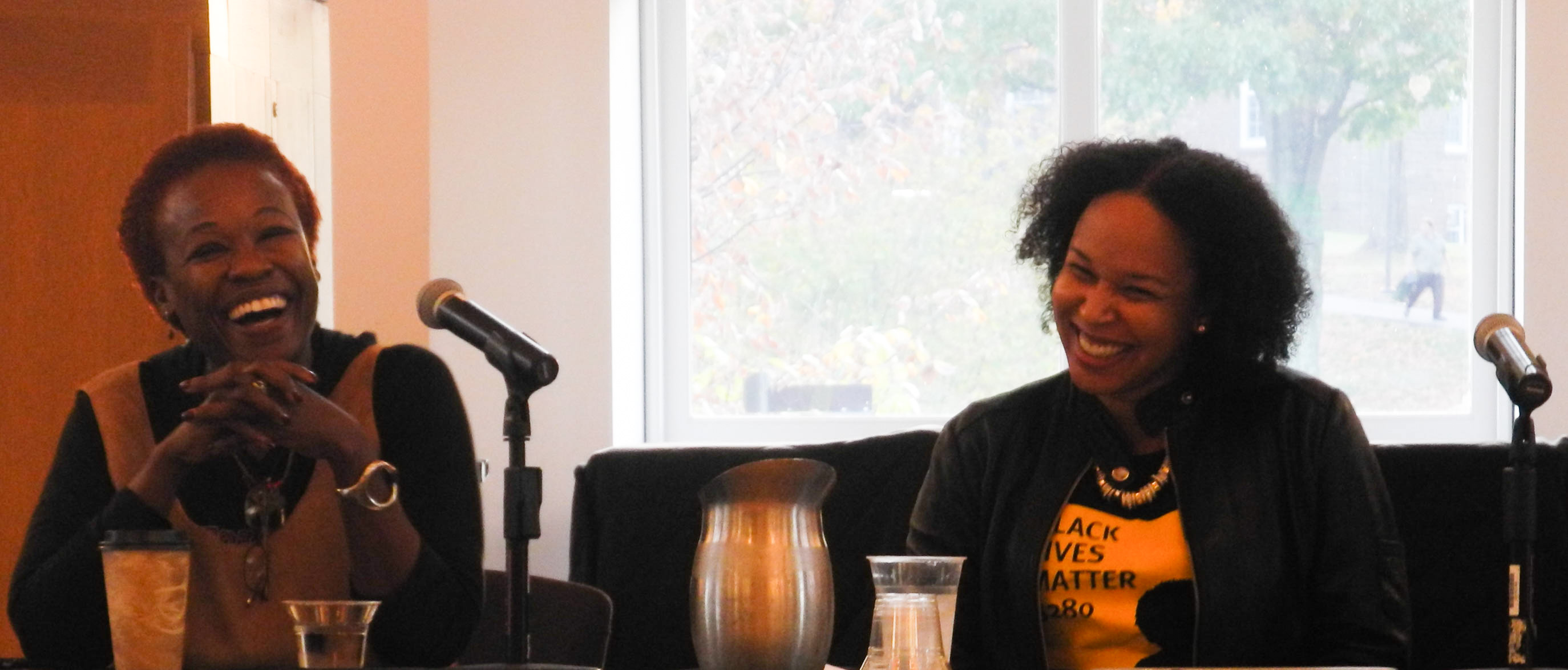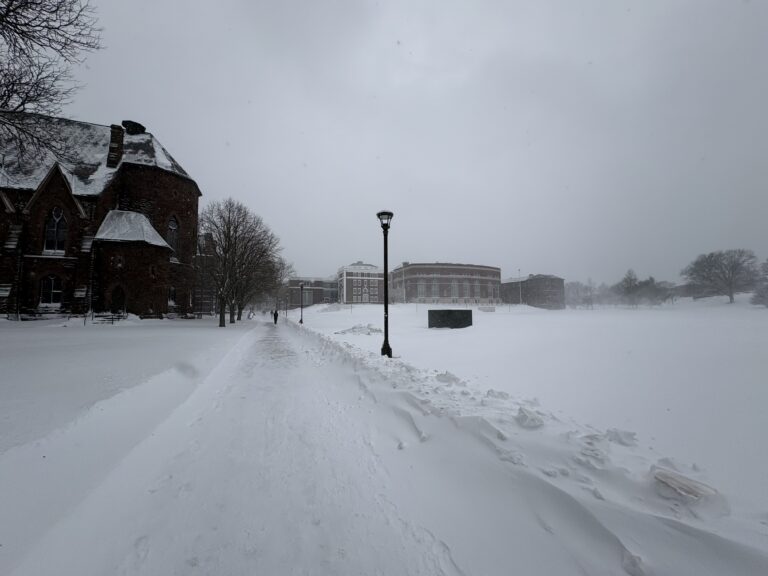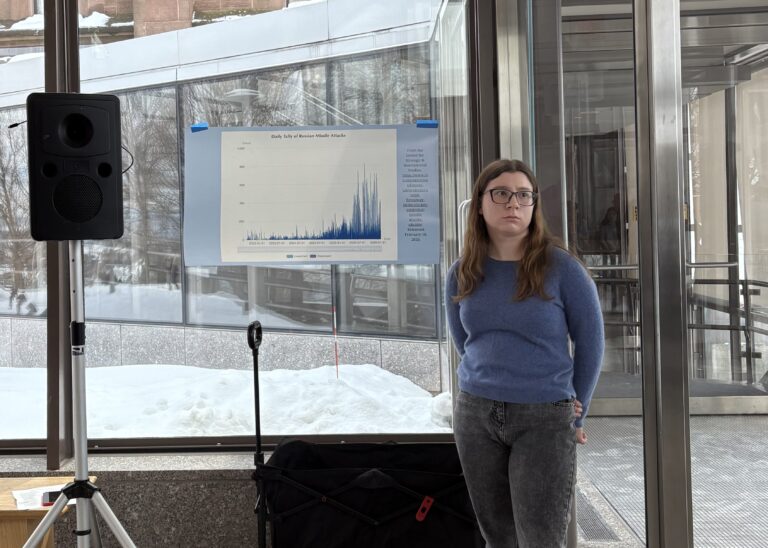University Hosts Panel Discussion on Anthropology, Academic Hierarchy, and Student Activism
On Nov. 1, University Professor of Anthropology and Feminist, Gender and Sexuality Studies Gina Ulysse, Professors Bianca C. Williams of the University of Colorado Boulder and Dawn-Elissa Fischer of San Francisco State University participated in a panel discussion in Beckham Hall in front of a large audience of University staff and students. The discussion, entitled “Anthropology and #BlackLivesMatter,” covered a variety of topics, particularly each professor’s personal history and how it has shaped their experience in academia.
The talk was hosted by the University’s Anthropology Department. Professor Margot Weiss, Chair of the Anthropology Department and Associate Professor of American Studies, Anthropology, and Professor of Feminist, Gender, and Sexuality Studies opened the discussion by providing context on the intersection of anthropology and the Black Lives Matter movement and introducing each of the panelists. From there, each panelist spoke for 10 minutes about her personal history and relationship to Black Lives Matter.
Fischer spoke first, noting that she had been following the recent news regarding Scott Backer and the relationship between students and administrators at the University. She hoped to engage with students to discuss their perspective on recent events.
“How does the condition that you are experiencing today, in 2016, compare to 1966?” she asked of students in the audience. “Are you feeling ’68-ish? Are you feeling ’72-ish? 1983-ish? 1992? 2004? I’m concerned.”
Fischer moved on to note that she comes from a legacy of activism that she hopes to bring to the University. She emphasized the importance of creating sustainable and visible change in communities such as the University and communities around the world.
Williams was the second speaker, and she explored her interests in the psyche of Black Feminism, which she has spent much of her career researching.
“As a black feminist cultural anthropologist, the main question that I say drives my research, my teaching, my service, my organizing, is, ‘How do black communities navigate the oppressive systems of sexism and racism without losing their minds?’” Williams said. “That’s what I study. I study black women and happiness because for me, emotion…is very much a good source of data. [I ask], ‘How does it feel to live at the intersection of these systems of oppression that we navigate daily?’”
Williams also brought up radical honesty, a term that refers to being truthful about respective biases, sharing identities, and filling in cultural gaps. She emphasized the use of knowledge and learning as a means of action, and also noted the importance of treating the multiple systems of oppression in society not as separate beasts, but as arms of the same systemic power.
“I came to anthropology because I believed that it was a field that would give me the tools and the skills to unlearn the things that I had been socialized to believe, and to help my students learn these things,” Williams said.
Last to give an introduction was Ulysse, who discussed the roles that Haiti and performance art have played in her life and career.
“I came to anthropology via Haiti,” Ulysse said. “There’s no other reason, really. It was what it meant to be a young Haitian person who migrated—yes, I’m an immigrant, and I love to say that—and tried to explain her country to people who didn’t quite understand it, or only understood it as the stereotypical poorest nation in the Western hemisphere. And I knew it was more complicated than that.”
She explained that she entered anthropology to explain Haiti to people in terms that they would understand and appreciate, and to learn enough so that in the future, she could create meaningful change.
“Anthropology to me was not even a question,” Ulysse said.
Ulysse also noted that anthropology bridged the gap between the arts and the sciences, which was extremely important to her, especially given her love of performance as a way of expression.
“Performance has saved me from Afro-pessimism,” she said. “Part of my turn to performance is to have that space where I can express my rage.”
After their respective 10-minute introductions, a Q&A session with the panelists followed. Ulysse opened by asking her fellow speakers about their experiences as anthropologists. Williams responded by meditating on her own identity as an anthropologist who is a woman of color. She spoke about her efforts to “decolonize” the field of anthropology, dismantling its staid hierarchies that deprive scholars like herself of agency.
“We’re being hired in Women and Gender Studies programs, or Africana Studies Programs, or Ethnic Studies, or American Studies programs, because somehow, no matter where we do the work, we’re not read as anthropologists,” Williams said. “And it sucks, for lack of a better word, because we see the decolonizing that a lot of our more senior folks are doing or even our peers, and for some reason we’re not being allowed to do that work within the discipline, because jobs don’t see us as anthropologists.”
Ulysse, in her response to Williams, gave an explanation of the word decolonizing in reference to anthropology.
“This is what I mean by decolonizing: We actually are in a moment where things are shifting in the discipline, because it doesn’t have a choice but to shift, given what’s happening with publications, given what’s happening in the world and how fast things are actually developing,” she said.
Later in the discussion, the panelists moved to answering audience questions. Topics ranged from the importance of diversifying university staff, to the need to dismantle white supremacy, to the 2016 election’s impact on people of color.
“The xenophobia, the racism and the misogyny is so real,” Ulysse said. “I’m scared. I mean I’m literally scared.”
Williams commented on this nation’s fear of putting black women at the center of power in any form, noting specifically that black women are often rendered invisible. She also commented that the issue of systemic racism is under-acknowledged.
“The problem is not the people in this room; it is the people who are not here,” Williams said.
The discussion finished with student input and commentary on Wesleyan’s administration, with multiple students explaining that they felt their perspectives and voices were going unheard and ignored.
Williams answered student commentary with advice on how to be heard.
“Y’all need to sit down, figure out how power operates on this campus, and figure out the long-term and short-term goals that help benefit everyone in that community,” Williams said. “Use your collective energy to round up and make people uncomfortable.”
Earlier on in the discussion, Fischer also offered a critical point of advice to students in the audience, no matter what discipline they might wish to pursue.
“We have to remember to continue to fight,” Fischer said. “Things didn’t just happen on their own. This is something for anthropology, but this is something for whatever field you’re in. Fight for your discipline. Fight for your theory. Fight.”








很不错的样子⊙0⊙